AI Agents in eCommerce: Transforming Customer Experience from Click to Checkout
Sector: AI + Data
Author: Nisarg Mehta
Date Published: 09/18/2025

Contents
- Understanding AI Agents in Modern eCommerce
- Key Applications of AI Agents in eCommerce
- The Customer Experience Transformation
- Measurable Business Effect and ROI
- Emerging Trends and Future Technologies
- Implementation Strategies and Best Practices
- Overcoming Implementation Challenges
- The Future of AI Agents in eCommerce
- AI-Driven Personalized Messaging: The GiftTree Case Study
- Conclusion
- FAQs
Artificial intelligence is leading a deep transformation of eCommerce, as AI agents are now able to learn, adapt, and make independent decisions throughout the consumer’s journey. The market for AI-powered eCommerce is worth $8.65 billion in 2025, fueled by retailers looking for intelligent customer interaction and automation in scale.
By 2032, this market will be worth $22.60 billion, highlighting how AI is actually changing the online buying experience, from customized suggestions and real-time customer service to price fluctuation and forecasted inventory. The transformation is not only technological; it’s transforming the way brands interact with and service consumers in the digital age.
Understanding AI Agents in Modern eCommerce
What Are AI Agents in eCommerce?
AI agents embody the next wave of artificial intelligence technologies that exceed mere chatbots or rudimentary automation software. These advanced systems are capable of processing customer information, making decisions on their own, and performing sophisticated tasks throughout the entire buying process. In contrast to standard pre-scripted chatbots, AI agents utilize complex machine learning models to grasp context, acquire knowledge from interactions, and modify responses in real-time.
Today’s eCommerce AI agents are holistic customer experience orchestrators that can manage everything from discovery of products to after-purchase support. They exist seamlessly across various touch points, websites, mobile applications, social media sites, email, and even voice assistants, thus enabling a harmonized, personalized shopping experience.
The Evolution from Chatbots to Intelligent Agents
The evolution from simple chatbots to highly advanced AI agents is a quantum leap in eCommerce technology. Simple chatbots in the past were only able to react to specific keywords and follow scripted conversation paths. Present-day AI agents have the ability to comprehend natural language, interpret customer intent, and respond to complex, multi-step conversations that appear truly human.
This transformation has been made possible by technical advancements in conversational AI, machine learning, and natural language processing technologies that allow agents to learn context, recall past interactions, and offer more advanced support. The outcome is a shopping experience that replicates the personalized service customers get in upscale stores, but at scale, 24/7.
Key Applications of AI Agents in eCommerce
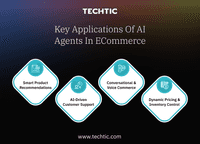
Product Discovery and Recommendations
One of the strongest uses of AI agents is in product discovery and recommendations. These applications review enormous amounts of customer information, from browsing activity to purchase histories, demographics, and even current activity in real-time, to present hyper-personalized product recommendations.
Powerful AI recommendation tools have the ability to boost revenue by 300% by offering consumers what they’re most likely to buy. Retailers such as Amazon have honed in on this strategy using their AI-driven shopping assistant Rufus, which looks at browsing history, previous purchases, and search history to serve up tailored suggestions and shopping guides.
The advanced nature of today’s AI agents permits them to consider several variables at once, such as size preferences, style orientation, browsing history, and even real-time stock levels. Such personalization has resulted in 24% of all orders now being initiated by AI-driven recommendations.
Intelligent Customer Service and Support
AI agents are transforming customer service through real-time, intelligent assistance capable of answering in-depth questions and solving problems independently. These systems have the capability to handle 70-80% of customer service requests on their own without human involvement, reducing response time by orders of magnitude and operational expense significantly.
The financial impact is significant: while human customer service interactions cost approximately $6.00 each, AI chatbot interactions cost just $0.50, a 12x difference in efficiency. Companies implementing AI customer service report an average $3.50 return for every $1 invested, with leading organizations achieving up to 8x ROI.
Real-world success stories illustrate this impact. H&M’s AI chatbot suggests outfits, monitors orders, and responds to customer inquiries 24/7, leading to shorter waiting times and increased customer satisfaction. Other organizations such as Rage Coffee have witnessed 20% boosts in customer satisfaction ratings after adopting AI chatbots.
Conversational Commerce and Voice Shopping
The advent of conversational commerce is a revolution in the way customers communicate with eCommerce platforms. Current AI agents are able to take customers through entire shopping experiences with natural conversation, from initial product discovery to final purchase and follow-up assistance.
Voice commerce, powered by AI, is transforming the shopping experience by enabling hands-free, natural language interactions. Companies like Amazon and Walmart have successfully implemented voice shopping that allows customers to reorder items and make purchases through simple voice commands. This technology particularly benefits customers with accessibility needs while also providing convenience for busy shoppers.
The infusion of multilingual capabilities into voice commerce AI platforms has unlocked global markets with enterprises such as Zalando providing voice-driven shopping in several languages across European nations.
Dynamic Pricing and Inventory Optimization
AI agents are particularly good at dynamic real-time pricing and inventory control. These systems provide insights based on market trends, competitor price data, customer demand patterns, and inventory levels to dynamically price products for optimal profitability. Amazon notoriously adjusts prices 2.5 million times a day using AI-based pricing algorithms.
In managing inventory, AI can lower inventory amounts by 20% as it increases service levels by 65% at the same time. This maximizes product availability versus lower holding costs, which has a direct effect on profitability. In peak seasons such as Black Friday, organizations such as JD Logistics have reached up to 95% accuracy for demand forecast through AI technology.
The Customer Experience Transformation
Hyper-Personalization at Scale
AI agents facilitate hyper-personalization that extends far beyond conventional segmentation practices. They design one-of-a-kind experiences for every customer based on individual behavior, preference, and real-time context. Businesses that employ AI personalization have 25% more customer satisfaction and up to 10% more engagement.
The revenue effect is dramatic: AI-powered personalized experiences can boost revenue by as much as 40%. That personalization goes beyond product recommendations to customized pricing, targeted marketing messaging, and personalized customer service strategies.
Seamless Omnichannel Experiences
Today’s AI agents offer uniform, frictionless experiences across every customer interaction point. Whether customers engage through web browsers, mobile applications, social media, email, or voice assistants, AI agents can keep context and continuity throughout the experience.
This omnichannel method has the end goal of providing customers with an ability to initiate a conversation on one channel and continue it on another without losing context or the need to repeat information. The outcome is a frictionless shopping experience that responds to customer preferences and situations.
Proactive Customer Engagement
AI agents not only answer customer questions but actively search for ways to improve the buying experience. These systems can recognize when customers experience checkout problems and act automatically with suggestions such as price reductions or other forms of payment.
Proactive action comprises cart abandonment prevention, where AI agents can notify customers of abandoned products and offer incentives to make purchases. This has helped companies realize 25% cart abandonment rate decreases with the use of generative AI agents.
Measurable Business Effect and ROI
Revenue Generation and Conversion Improvement
The financial impact of AI agents on eCommerce is measurable and substantial. Companies embracing AI solutions see a 20% revenue boost on average, with other companies registering even higher returns. Specifically, 12.3% of customers convert after engaging with chatbots compared to just 3.1% without the assistance of AI agents.
E-commerce businesses that have implemented AI chatbots experience their average order value increase by a mean of 20% within the initial week of usage. Chatbots can drive sales by 67%, indicating how effective they are in converting browsers into buyers.
Operational Efficiency and Cost Reduction
AI agents offer significant operational efficiency advantages to different business processes. AI deployment reduces costs by 8% on average, and 94% of the retailers who use AI achieve reduced costs through improved inventory management and automation.
The efficiency gains are also realized in customer service functions, where thousands of queries can be responded to by AI simultaneously, reducing wait times by as much as 50% and achieving 20% cost savings in customer service activities. Service representatives save an average of 1.2 hours per day through AI-enabled tools.
Customer Satisfaction and Retention
AI agents are very effective in influencing customer satisfaction and retention rates. Companies using AI see 10-15% increase in customer retention rates and customers’ satisfaction scores increase by an average of 25%.
AI responsiveness speed is a significant contributor to the provision of satisfaction improvements. As 72% of customers anticipate a response within 5 minutes, AI chatbots are in a position to meet the expectations instantly. This real-time responsiveness translates to higher customer loyalty and improved lifetime value.
Emerging Trends and Future Technologies
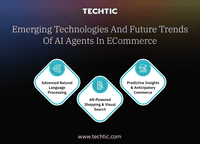
Advanced Natural Language Processing
The newest AI agents take advantage of high-level natural language processing capabilities that facilitate more human-like interaction. Such systems are capable of understanding context, inferring subtle cues in customer communication, and responding in the right empathetic and personal tone.
Some of the latest developments involve the capacity to deal with intricate, multi-stage requests and preserve context in long conversations. This allows AI agents to provide support for complex product comparisons, lengthy troubleshooting, and complete shopping advice.
Integrating with Augmented Reality and Visual Search
AI agents are more and more incorporating into visual search and augmented reality platforms. Visual search features such as Google Lens and Pinterest Lens enable customers to discover products simply by snapping a picture, whereas AI agents can offer further background information and suggestions as per visual inputs.
This convergence creates new shopping experiences where consumers can snap items they like and instantly get recommendations for similar or complementary products. The marriage of AI agents and AR technology makes virtual try-on and product visualization possible and builds confidence in buying.
Predictive Insights & Anticipatory Commerce
Contemporary AI agents use forecasting analytics to foresightedly predict what customers need prior to when they’ve verbally defined their need. They look at customer behavior patterns, seasonality, and external influences and forecast what the customer may need and when.
Anticipatory commerce extends beyond suggestions to encompass automatic ordering of consumable goods, proactive customer outreach for customer service, and predictive stock management. It provides a shopping experience that seems nearly magical in its responsiveness to customers’ needs.
Implementation Strategies and Best Practices
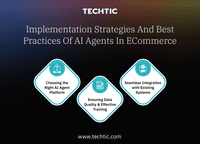
Selecting the Right AI Agent Platform
Choosing the right AI agent platform involves cautious consideration of business needs, technical functionality, and scalability requirements. Successful deployments begin with well-defined goals and quantifiable measures of success.
Key considerations involve integration with current systems, customization, multilanguage support, and the capacity to support peak traffic loads. The platform must also offer solid analytics and reporting features to gauge performance and ROI.
Data Quality and Training Requirements
High-quality training data and continuous optimization are needed for effective AI agents. This encompasses customer history of interactions, product catalogs, inventory information, and performance metrics. The quality of training data determines the capacity of the agent to offer accurate and useful responses.
The provision of regular training updates and monitoring of performance ensures continuous improvement in AI agents over a period of time. This entails reviewing conversation logs, common issues detected from customers, and improving responses based on customer feedback.
Integration with Current Systems
Effective AI agent deployment necessitates smooth integration with current eCommerce platforms, customer relationship management systems, inventory management systems, and payment processors. Integration guarantees AI agents receive real-time data for offering precise assistance.
The integration also needs to have adequate security controls in place to safeguard customer data and follow privacy regulations. Secure data transmission, access control, and audit trails for all AI agent interactions are included.
Overcoming Implementation Challenges
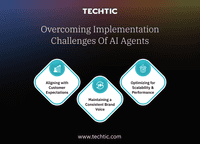
Managing Customer Expectations
One of the most important challenges with implementing AI agents is balancing customer expectations against establishing trust in automated interfaces. Customers must know when they’re communicating with AI agents or human representatives, and when escalation to human support is accessible.
Effective implementations promote transparency in communicating AI strengths and weaknesses while facilitating smooth handoffs to human agents when necessary. This approach helps establish trust and makes customers feel cared for during their journey.
Maintaining Consistent Brand Voice
AI agents have to maintain consistent brand voice and personality in every interaction. This involves proper training on brand guidelines, tone of voice, and communications style preferences.
Ongoing monitoring and realignment ensure the AI agents remain representative of the brand over time as they learn and grow. This involves a review of conversation logs and modifying training material to keep the brand consistent.
Scalability and Performance Optimization
As eCommerce companies scale, AI agents need to scale efficiently to support larger volumes of interaction without compromising performance. The same calls for solid infrastructure planning and monitoring of performance.
Scaling successfully entails load balancing, redundancy planning, and ongoing performance optimization to guarantee constant response times even amid peak shopping seasons. Capacity planning on a regular basis ensures that AI agents can support growth in customer interactions.
The Future of AI Agents in eCommerce
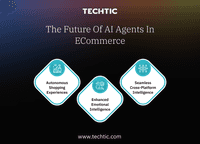
Autonomous Shopping Experiences
The future of eCommerce AI agents will be toward completely autonomous shopping experiences in which AI systems are capable of fully automating purchase processes on behalf of customers. This encompasses automated reordering on the basis of usage patterns, proactive price tracking, and self-processing of returns.
These capabilities will necessitate high-level trust mechanisms and customer controls to guarantee that autonomous behavior matches customer intent and desires. The creation of these systems is the next step in AI-commerce.
Increased Emotional Intelligence
Future AI agents will incorporate advanced emotional intelligence capabilities that can recognize and respond to customer emotions and stress levels. This includes adapting communication style based on customer mood and providing appropriate support during difficult situations.
These emotionally aware systems will develop more sensitive and helpful shopping experiences that forge closer customer relationships. Having the capacity to sense frustration, excitement, or confusion will allow AI agents to be more suitable and efficient in their help.
Cross-Platform Intelligence
The progression toward cross-platform intelligence will allow AI agents to hold customer context and preferences together across various brands and shopping platforms. This concept of a universal shopping assistant would be present no matter where customers shop.
This breakthrough will need industry standards and cooperation to foster interoperability while preserving competitive benefits. The outcome will be seamless shopping experiences throughout the digital commerce ecosystem.
AI-Driven Personalized Messaging: The GiftTree Case Study
One of the most inspiring demonstrations of AI personalization at work is GiftTree’s Shopify store makeover. GiftTree implemented an AI-driven message generation system that creates customized, culturally sensitive gift messages from recipient information like location. This technology brings an emotional depth to the gift-giving process, making messages resonate in a special way with each recipient.
This AI-powered functionality not only enhances the customer experience but also streamlines the gift-giving process by automating the creation of messages. GiftTree’s rollout illustrates how AI agents can enhance emotional bonding with customers beyond product suggestions, creating loyalty and satisfaction in the online gifting marketplace.
Conclusion
AI agents are revolutionizing eCommerce development at its very core by developing smart, customized, and optimized shopping experiences for both consumers and firms. With the industry projected to hit $22.60 billion by 2032, AI agent adoption is not a choice but a necessity for competitive advantage.
Measurable gains, such as 20% revenue growth, 67% sales lift, and 25% cost savings, illustrate how AI agents provide high ROI while improving customer satisfaction. As these technologies mature, early adopters will gain strong competitive positions in the rapidly evolving eCommerce marketplace.
The eCommerce future is in the hands of companies embracing AI agents as strategic allies to craft amazing customer experiences. From AI-driven product discovery to automated shopping support, AI agents are not only streamlining current processes, they’re making new ways of interacting with customers and accelerating business growth possible. The click-to-checkout evolution has already begun, and companies who move today will define digital commerce’s future.
FAQs
Q: What is an AI agent in eCommerce?
An AI agent in eCommerce is an advanced virtual assistant powered by artificial intelligence that helps online stores automate customer service, personalize product recommendations, optimize order processing, and streamline backend operations. These smart agents use machine learning and natural language processing to interact with shoppers, answer questions, and enhance the online shopping experience.
Q: How do AI agents improve the customer experience on eCommerce sites?
AI agents continuously monitor customer behavior, answer questions around the clock, recommend relevant products, resolve order issues, and provide instant support. With features like personalized search and automated FAQ handling, they reduce friction, making shopping faster, easier, and more satisfying for users.
Q: Can AI agents really boost eCommerce sales and conversions?
Yes, AI agents can directly increase sales and conversions by providing personalized upselling and cross-selling suggestions, sending cart abandonment reminders, and offering timely product recommendations. Many brands report up to a 20% growth in revenue and a significant drop in abandoned carts after implementing AI-powered assistants.
Q: What are some real-world examples of AI agents in action?
Major retailers like Amazon, H&M, and innovative stores are using AI agents for product recommendations, instant support, gift personalization, order tracking, and automated returns. For example, GiftTree’s AI system creates custom gift messages based on recipient details, while H&M’s chatbot assists with order updates and FAQs.
Q: What are the benefits of using AI agents in eCommerce?
AI agents in eCommerce boost sales and customer satisfaction by delivering personalized product recommendations, providing 24/7 automated support, reducing response times, and streamlining operations from checkout to returns. They help businesses increase conversion rates and improve shopping experiences with tailored suggestions and proactive engagement.



